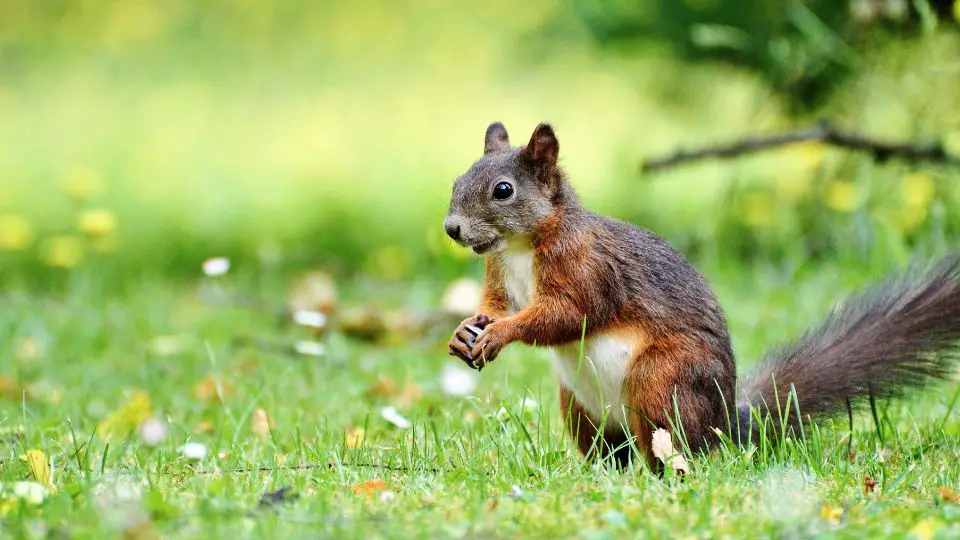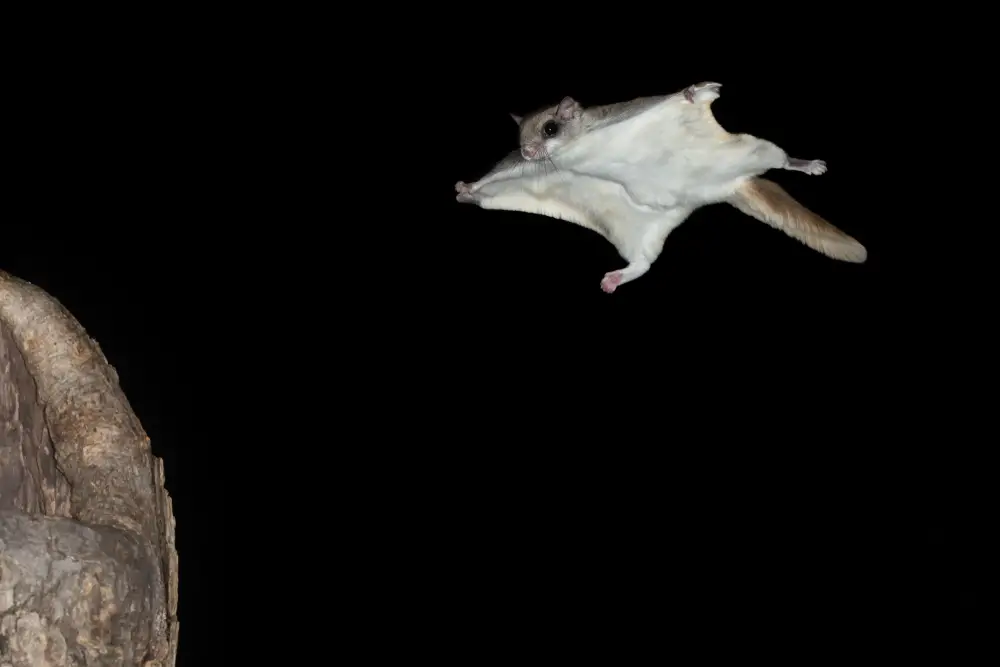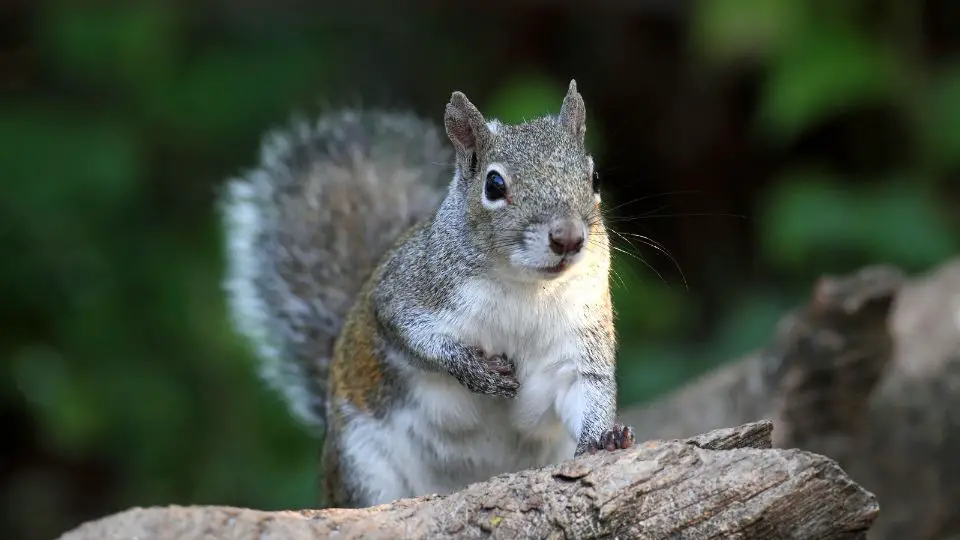Squirrel sounds are commonly recognized as repetitive chatters, yells, barking, and other weird noises. Squirrel alarm sounds are usually rattles, screeches, snorts, and barks.
You might have heard squirrels and probably thought they were birds or other animals you were hearing. In North America, for instance, squirrels are common in both urban and rural areas.
There are over two hundred confirmed species of squirrels, and they make different sounds. Squirrels make these sounds to communicate a variety of signals. They also use other visual signs, such as tail flicking, that vary among species.
In this guide, we’ll answer the question, “what does a squirrel sound like?,” what the different sounds mean, and how to identify them. Let’s dive in!
Table of Contents
What are the squirrel sounds?
Gray squirrels have three different sounds mainly used as vocal alarms when they spot potential ground or aerial predators. They use these sounds to protect their territories and themselves.
The Kuk, muk-muk, and quaa sounds are primarily used to show mating interests and usually are used by male squirrels. Below are the normal squirrel noises:
- Screeches: defending territory
- Rattles: defending territory
- Buzz: alarm call
- Barking: alarm call
- Quaa: warning sound
- Kuk-kuk-kuk: warning sound
- Seet-bark: aerial predators
- Seet: distress call from terrestrial predators
- Muk-muk: baby squirrel sounds or a squirrel mating call
- Crying: baby squirrels
- High-pitched chirp: baby squirrels calling for mother
Why is a squirrel making weird noises?
Squirrel calls may sound like they’re scolding people or your cat. However, most squirrel noises are alarm signals to warn other nearby squirrels of danger and warn off predators. These sounds generally differ from the sounds they make while mating and protecting their food from other squirrels.
Different species of squirrels make different sounds but mainly revolve around mating calls, hunger calls, threatening calls, noisy alarm chatter, and warning sounds.

What does squirrel chatter mean?
You might initially think this is a bird if you’re not savvy about animal noises. However, after tracking down the noise, you’ll soon see it’s a squirrel chattering at high volume.
You might have wondered why squirrels chatter like maniacs. Below are the main reasons why squirrels chatter repetitively:
- Alert their neighbors of approaching predators
- Protect their territory from rival squirrels
- Baby squirrels begging for food
- Initiating mating with another squirrel
- Annoy and scold a predator to leave the area
Squirrels will continue emitting these chatters until they are sure it has been heard and understood by the desired target or until the threat has left the area.
For this reason, squirrel chatters often seem to be never-ending to humans. As strange as this behavior may seem, this is a logical survival method for the squirrels.
Do squirrels squeak at night?
Yes, squirrels make noise at night as certain species are primarily nocturnal.
Flying squirrels, for instance, have skin flaps behind their front legs, making them seem like they’re flying. However, they don’t actually fly but glide from one tree to another.
These nocturnal squirrels are more silent and make less noise than the typical red and gray squirrels. They usually make high-pitched chirping sounds when communicating and can also make ultrasonic sounds that humans cannot hear.

What does a squirrel sound like in the attic?
Squirrels may manage to find their way into your attic and set base. Therefore, if you live in a squirrel area, you’ll hear some sounds in your attic and may want to know the animal living there.
Typically, squirrels make scampering, rustling, shuffling, scurrying, and scratching sounds in the attic. Due to their size, these noises can be pretty loud.
You could also hear an odd rolling sound coming from the attic produced when they roll nuts and acorns. In addition, late at night, you might hear high-pitched sounds that may make it difficult to sleep at night.
However, squirrels are more crepuscular animals, most active during the evening and early morning hours. You could hear gnawing as they chew on the wires and walls and crawl around.
How do you tell if you have squirrels on your walls?
Of all pests and animals, squirrels are perhaps the most accustomed to being around people. These little animals can be a nuisance. The following signs will tell you if you’re harboring squirrels in your walls:
- Squeaking, scurrying, scratching, or chirping sounds in the walls
- A foul odor that appears to be localized
- You see squirrel droppings in or around the house
- You notice the same or two squirrels always around the house
- You see squirrel tracks
- Some water seeping inside the walls

What to do if you identify squirrel sounds in your house?
Squirrels love fresh vegetables, fruits, and flowers, making them a problem for home gardeners. These wily critters are professional pickers that will pluck all your ripe tomatoes, flowers, bird eggs, insects, buts, acorns, bulbs, apples, and vegetables.
Therefore, if you identify squirrel sounds in your house, you’ll want to find a way to repel them. You can use the following clever tips to control and prevent squirrels and other pests like raccoons.
- Ensuring you have tight-fitting garbage and trash cans
- Avoid leaving compost scraps and leave food outside
- Call a professional wild animal removal expert who knows the regulations in your area
- Using netting, covers, and fencing
- Using predator urine, owls, and dogs
- Using motion-activated sprinkler systems
- Plant plants and flowers they hate, such as daffodils, allium, hyacinth, and snowdrops
- Protecting bulbs from squirrels

